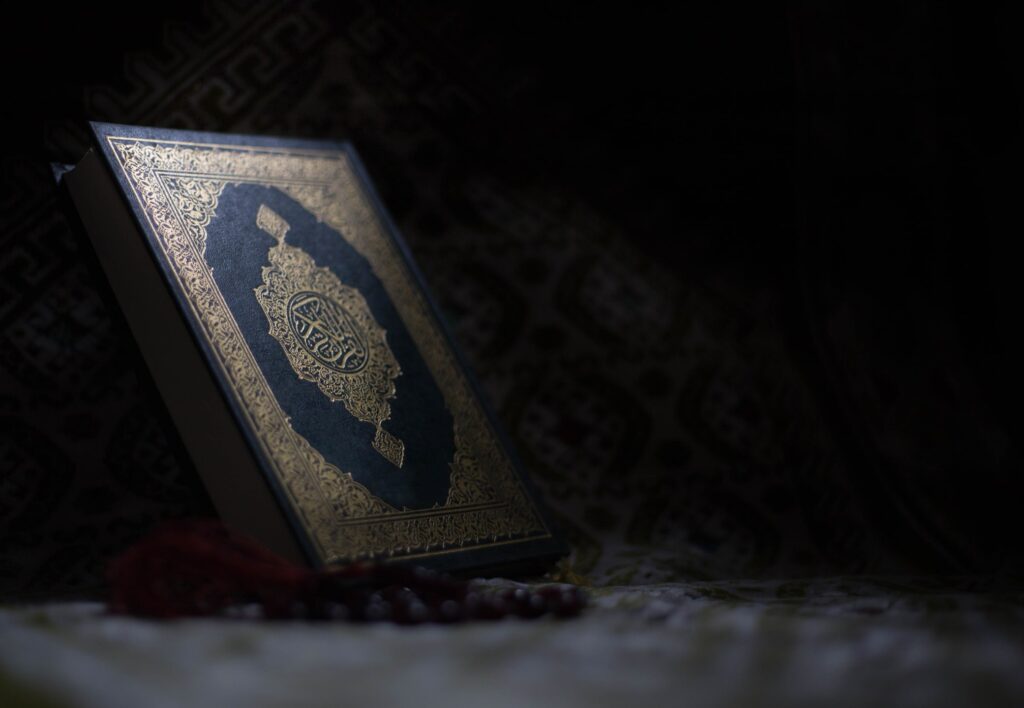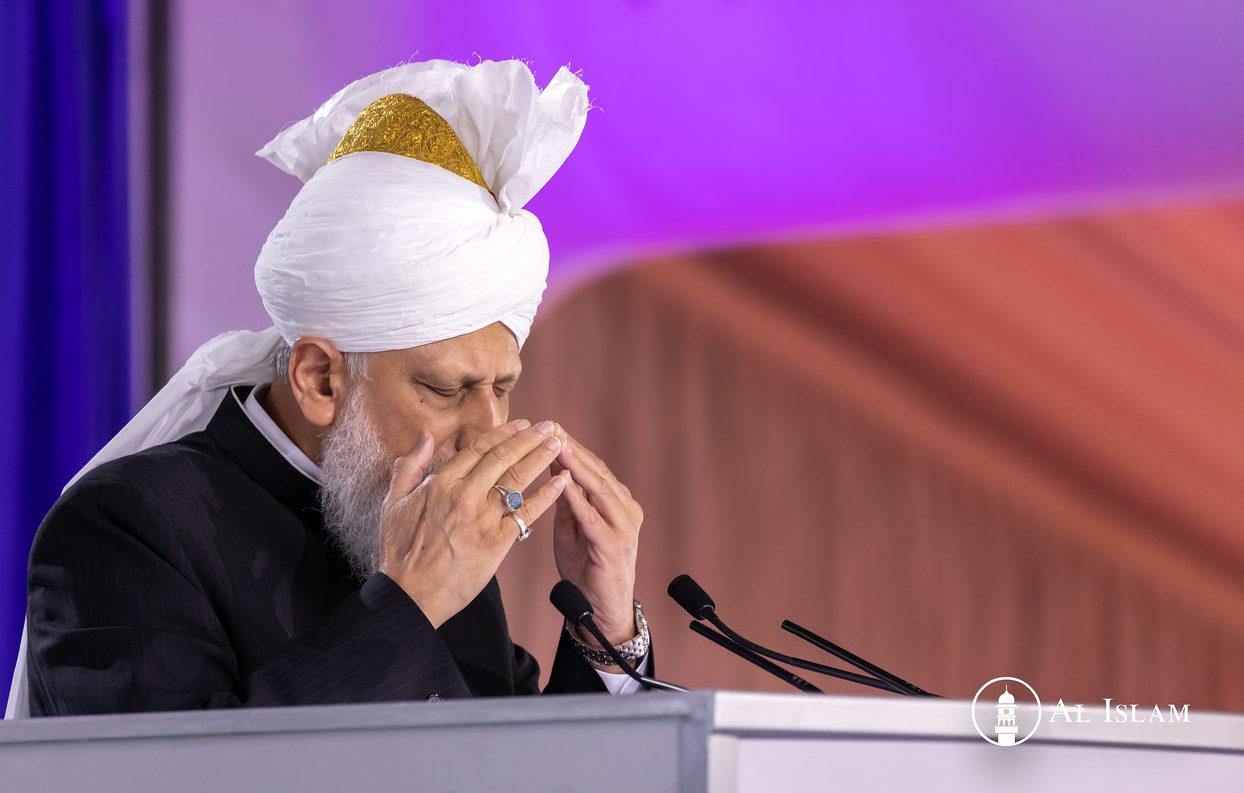The injunction of Hijab is not just recommendatory. Nor is the concept of Purdah an innovative practice. Those who observe Hijab abide by the fundamental commandment of the Holy Quran.
This is the first in our series “Quranic Exegesis”, where we will be presenting the Ahmadiyya interpretation of selected verses of the Holy Quran in the words of the Founder and Caliphs of the Ahmadiyya Muslim Community.
In today’s age, Islam is subjected to heavy criticisms and its teachings and commandments are highly misunderstood. It is evident that most of these criticisms stem from the misinterpretation of the Quranic text and hence, an accurate and true explanation of the scripture is called for. It is in view of this that we intend to present through this series, the authentic explanation of the Holy Quran provided by the leaders of the Ahmadiyya Muslim Community, which we believe will do a great deal in clearing the numerous misconceptions that have become associated with Islam.
In this issue of the series, we present the explanation of Chapter Nur verse 32 of the Holy Quran provided by the current Caliph of the Ahmadiyya Muslim Community, Hazrat Mirza Masroor Ahmadaba during his address to ladies at the 2005 Jalsa Salana Sweden. We have included lexical analysis of the keywords contained in the verse, for which, Tafsir-e-Kabir (The Grand Exegesis by the Second Caliph of the Community) and the five-volume Holy Qur’an with English Translation and Commentary have been consulted.
MARCH 21, 2022
وَقُلْ لِلْمُؤْمِنَاتِ يَغْضُضْنَ مِنْ أَبْصَارِهِنَّ وَيَحْفَظْنَ فُرُوجَهُنَّ وَلَا يُبْدِينَ زِينَتَهُنَّ إِلَّا مَا ظَهَرَ مِنْهَا وَلْيَضْرِبْنَ بِخُمُرِهِنَّ عَلَى جُيُوبِهِنَّ وَلَا يُبْدِينَ زِينَتَهُنَّ إِلَّا لِبُعُولَتِهِنَّ أَوْ آبَائِهِنَّ أَوْ آبَاءِ بُعُولَتِهِنَّ أَوْ أَبْنَائِهِنَّ أَوْ أَبْنَاءِ بُعُولَتِهِنَّ أَوْ إِخْوَانِهِنَّ أَوْ بَنِي إِخْوَانِهِنَّ أَوْ بَنِي أَخَوَاتِهِنَّ أَوْ نِسَائِهِنَّ أَوْ مَا مَلَكَتْ أَيْمَانُهُنَّ أَوِ التَّابِعِينَ غَيْرِ أُولِي الْإِرْبَةِ مِنَ الرِّجَالِ أَوِ الطِّفْلِ الَّذِينَ لَمْ يَظْهَرُوا عَلَى عَوْرَاتِ النِّسَاءِ
And say to the believing women that they restrain their eyes and guard their private parts, and that they disclose not their natural and artificial beauty except that which is apparent thereof, and that they draw their head-coverings over their bosoms, and that they disclose not their beauty save to their husbands, or to their fathers, or the fathers of their husbands or their sons or the sons of their husbands or their brothers, or the sons of their brothers, or the sons of their sisters, or their women, or what their right hands possess, or such of male attendants as have no sexual appetite, or young children who have no knowledge of the hidden parts of women.
Holy Quran 96:2-6
Keyword Analysis
خمر Khumur (head-coverings): Khumur is the plural of khimār. Khimār is ھو ما تغطّی بہ المرأۃ رأسھا. i.e. the cloth with which a woman covers her head[1]; a woman’s head-covering; a piece of cloth with which a woman covers her head; also a man’s turban, because a man covers his head with it in like manner as a woman covers her head with her khimār[2].
جيوب Juyūb (bosoms): Juyūb is the plural of jaib which is derived from jāba. They say jābahu i.e. he made a hole in it; or rent it, or tore it. He cut it in like manner as one cuts a jaib or an opening at the neck and bosom of a shirt. Jaib is the opening at the neck and bosom of a shirt. The Arabs often carry things within the bosom of the shirt and hence the word is now applied by them to a pocket.[3]
Jaib also denotes the heart, or the bosom. So in the saying, ھو ناصح الجیب (huwa nāsihul jaib) i.e. he is pure, or sincere, of heart or bosom, or trustworthy, or faithful.[4]
Exegesis
Purdah is a fundamental Islamic commandment and has been clearly explained in the Holy Quran. People who do not read the Holy Book attentively are of the opinion that Allah has not laid much stress on it. It is such an explicit instruction and I have mentioned it two or three times earlier as well… What does the Holy Quran say about Purdah? It is a long verse and contains the command:
وَلَا يُبْدِينَ زِينَتَهُنَّ إِلَّا مَا ظَهَرَ مِنْهَا وَلْيَضْرِبْنَ بِخُمُرِهِنَّ عَلَى جُيُوبِهِنَّ
and that they disclose not their natural and artificial beauty except that which is apparent thereof, and that they draw their head-coverings over their bosoms.
وَلَا يُبْدِينَ زِينَتَهُنَّ إِلَّا لِبُعُولَتِهِنَّ أَوْ آبَائِهِنَّ أَوْ آبَاءِ بُعُولَتِهِنَّ أَوْ أَبْنَائِهِنَّ أَوْ أَبْنَاءِ بُعُولَتِهِنَّ
And then there is a long list; that “they should not disclose their beauty except to their fathers, their husbands and their sons.”
Now, because it is written therein that ‘the outer coverings be drawn over the bosoms’, some people proclaim that as the commandment is to cover the bosom, wearing a Dupatta or a scarf around the neck is enough. The command is ‘not to display your beauty’, which means that when you go out, the covering should be wide enough to cover the physical beauty of the whole body as well. At another place, covering of the head is also commanded. That is why throughout the Islamic world, wherever there is some concept of observing Purdah, the perception of covering the head is manifest. Everywhere, Hijab (head covering) or Niqab (face covering) or something of the like is used, a scarf may be worn or a wide wrap is worn. Thus, Allah has said,
وَلْيَضْرِبْنَ بِخُمُرِهِنَّ عَلَى جُيُوبِهِنَّ
“draw their head-coverings over their bosoms”, which means that the covering should be big enough to cover the head and the body. It is permissible to come in front of fathers, brothers and sons without this covering. Surely, when a woman comes in front of her father, brothers and sons, she is in a decent dress, but the face is uncovered. He added that the face can be uncovered in presence of fathers, brothers, sons and other Mahram relatives, but it should not be so when you go out. These days, wraps or shawls are not used, instead, Niqab, Burqa or coats are worn. This restriction is not rigid to the extent of causing suffocation by covering the nose tightly. Besides, the nose can remain uncovered to breathe easily, but lips and chin should be covered. Otherwise, use a big Chador (shawl) and wrap it as Allah has said to cover your head. Purdah happens easily on its own – a large Chador (shawl) easily veils a face. If a Burqa is worn for its ease, it should be such that complies with this command.
REFERENCES
[1] Aqrab al-Mawarid
[2] Arabic-English Lexicon by Edward William Lane
[3] Ibid
[4] Ibid












4 Comments
Shah Mahmood Ahmad · March 22, 2022 at 8:48 am
very rightly explained
Inamullah · March 25, 2022 at 2:35 am
Assalamu alaikum wr. wbr.
very nice article, please send me the continuation of this article.
JazakALLAH Khair
Zubair · May 15, 2022 at 8:59 am
It would also be good to provide one of the Hadith that provides context for this verse. It is from Sahih Bukhari.
Narrated Aisha: The wives of the Prophet (ﷺ) used to go to Al-Manasi, a vast open place (near Baqi` at Medina) to answer the call of nature at night. `Umar used to say to the Prophet (ﷺ) “Let your wives be veiled,” but Allah’s Apostle did not do so. One night Sauda bint Zam`a the wife of the Prophet (ﷺ) went out at `Isha’ time and she was a tall lady. `Umar addressed her and said, “I have recognized you, O Sauda.” He said so, as he desired eagerly that the verses of Al-Hijab (the observing of veils by the Muslim women) may be revealed. So Allah revealed the verses of “Al-Hijab” (A complete body cover excluding the eyes).
Dilkash Ahmad · May 27, 2022 at 3:36 pm
Nicely written.
It is also very important to know the context as explained above.
In addition to the above, we must consider the prevailing situation when this commandment was revealed by Allah (SWT).
During those days, it was very difficult to differentiate between slave women and free believing women from their dressings. Commandment of Purdha came as a relief or protection for free believing women who were targeted and bullied in public as there was no difference in dressing between them and slave women.
The commandment of Purdha helped them to get identified as free women and therefore, they did not have to face the difficulties like slave women. This was the easiest option to distinguish between slave and free women.
The Holy Qur’an says:
“O Prophet! tell thy wives and thy daughters and the women of the believers that they should draw close to them portions of their loose outer coverings. That is nearer that THEY MAY THUS BE DISTINGUISHED AND NOT MOLESTED. And Allah is Most Forgiving, Merciful.”
Surah Al Ahzab verse number 60